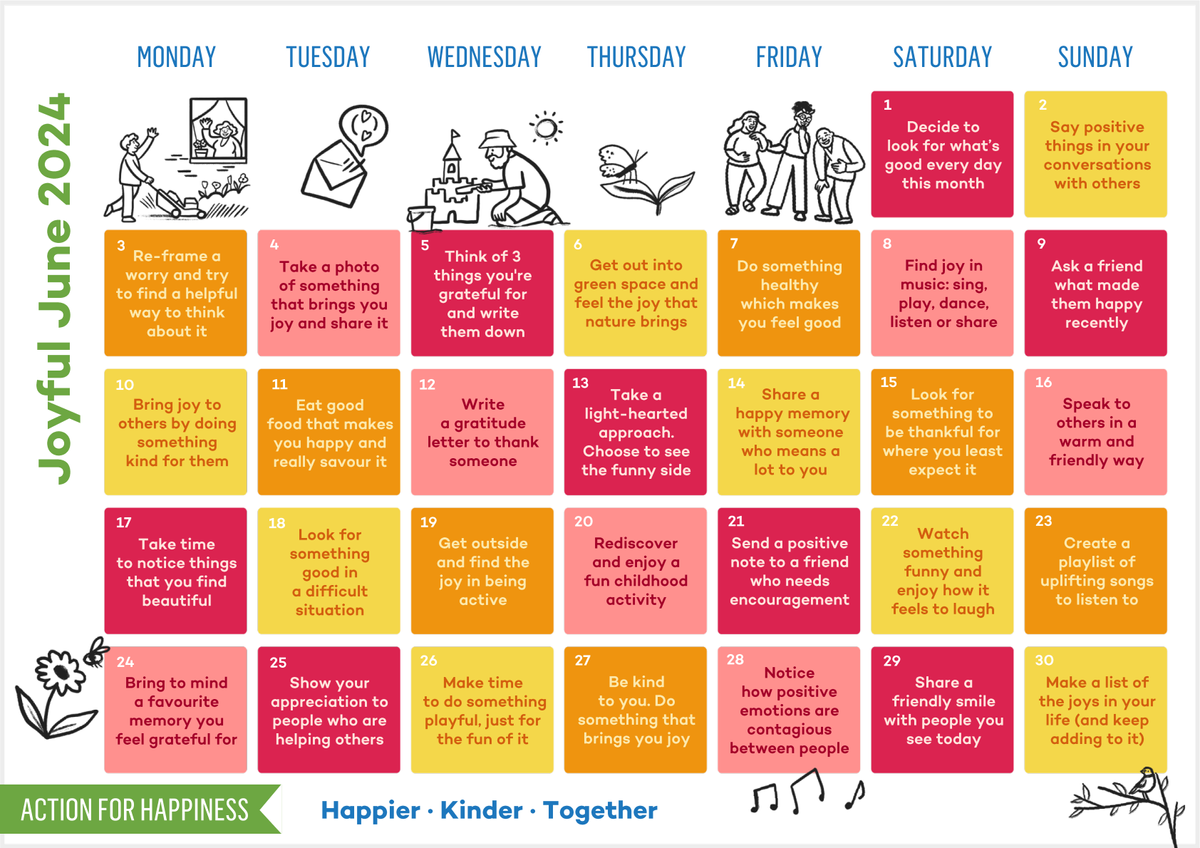Wellbeing

A message from Emily Murcott - Assistant Principal / Wellbeing Literacy Leader
Joyful June
Joyful June is all about feeling, expressing, or creating great pleasure and happiness.
What is one thing that will bring you joy right now?
There are big proponents of life that bring joy and there are plenty of small things that can brighten your day and bring playfulness and creativity closer to you. I want to ask yourself "what simple things can I do to spark joy in my life?"- this is a list to remind you of all the easy things you can do to treat yourself to some joy. So, without further ado, here is a calendar created by Action For Happiness for you to follow throughout May. Otherwise you could create your own Joyful calendar or write a list of things and try to complete them by a particular date.
Celebrating Diversity: Nurturing Every Student, Every Ability
Have you considered what it may be like for parents with a child with a disability?
Whether your child has a developmental issue, a physical disability, or a sensory impairment such as vision or hearing loss, their disability can have a significant impact on both of your lives. Studies show that parents of children with chronic physical problems, such as cerebral palsy or blindness, for example, experience higher stress than other parents.
Every parent worries about their children and how to provide the best for them in life. But when your child has a disability, these fears are often magnified. These parents may worry about how you’ll handle the practical aspects of care giving. What will public outings be like? What about schooling? How will they balance looking after their child with other household and family responsibilities? How can you make their home safer or more accessible for their child?
Beyond the practical considerations, They will likely also face significant emotional challenges. These parents might fear that their child will never be able to live what is considered a “normal” life, or worry the physical challenges they face could limit their opportunities.
Parents may feel isolated if they are unable to attend certain social events with their child, or enjoy certain physical activities, such as sports. Parents may even worry about the social stigma that their child could face, or how other people may perceive them. Will their child experience 'mean on purpose' behaviours frequently? Feel excluded or ignored?
It’s easy for these emotional and care giving challenges to leave parents feeling overwhelmed by stress and anxiety. Since every child is unique and every parenting journey different, the circumstances these parents deal with may be very different from those facing other parents of children with disabilities. The path forward often involves identifying potential roadblocks, reaching out for support, and determining how best to adapt to each challenge.
Common challenges facing parents of children with disabilities
Raising a child with a disability can come with unique challenges, including the mental stress and physical exhaustion of family care giving. Obstacles may include:
- Dealing with difficult emotions. They may feel guilty if they question whether they could’ve prevented their child’s disability. Anxiety and depression can set in if you see your child in pain or struggling with their condition. Parents may even feel angry or abandoned if they believe they're not getting support from other family members. When it comes to disabling conditions that are expected to get progressively worse over time, they may experience anticipatory grief, grieving a loss before it occurs.
- Maintaining other responsibilities. When caring for a child with a disability, it can be difficult to balance work, home, and care giving responsibilities. Parents may be tempted to cut back on sleep, but that will only lead to a host of other issues, like fatigue, higher stress, and a weakened immune system. If the family includes other children, they may worry about ensuring their needs are also met—as well as their own self-care.
- Managing their child’s medical care. Navigating the healthcare system can often be an overwhelming experience. If they are raising a child with a disability, it's likely they will spend extra time researching treatment options and local resources. Then, of course, they will need to schedule and attend medical appointments, fitting all of this into their other daily responsibilities.
- Advocating for their child. Whether in the classroom or at social events, parents may need to speak up for their child or ask for accommodations. To do this, parents not only need to educate themselves on their child’s disability, but also communicate effectively to others.
I would hope that as a community that we are all non-judgemental towards all families within our lovely RHPS community. We all need to understand and recognise that we cannot begin to understand the complexities of other families. I ask that everyone be open minded when a concern arises and consider how you approach the subject of your child's peers behaviour. Although a disability is no excuse for some behaviours, it is important that everyone takes time to understand or consider what other families may be going through.

